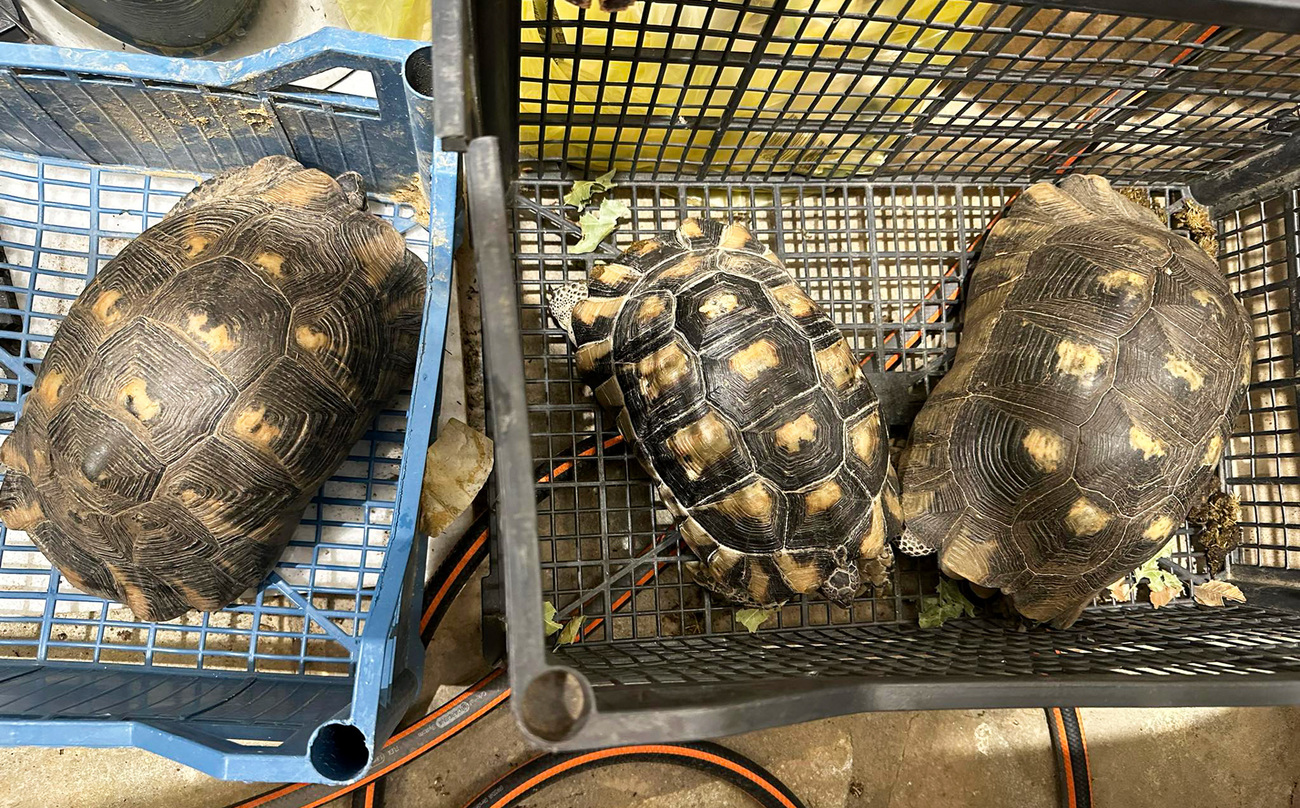Rescuing animals during disasters – Europe
save human lives by saving animals before, during and after disastersGreek fires: Ecological disaster threatens tortoises
Greek fires: Ecological disaster threatens tortoises

(The Hague, 11 September 2023) – Thousands of animals are still suffering and even dying after wildfires charred swathes of land in Greece, including large parts of Dadia-Lefkimi-Soufli Forest National Park, home to numerous wildlife species such as birds of prey, butterflies, bats and tortoises.
Wildfires have continued to cause havoc in Greece, as hundreds more broke out in late August, burning over 93,000 hectares (230,000 acres) of land by early September, with the one in Dadia deemed the largest wildfire ever recorded in the European Union (EU).
Overwhelmed by the huge influx of animals in need, ANIMA –a wildlife rescue and rehabilitation center near Athens and Greece’s main First Aid Station for wildlife– reached out to International Fund for Animal Welfare (IFAW) for additional support.
Having received over 400 injured tortoises since the fires in July, ANIMA requested expertise in the rescue, rehabilitation and release of these animals. In response, IFAW is deploying to Greece between 11 and 16 September together with SOPTOM, an NGO focused on studying and protecting tortoises and other reptiles in France and across the globe.
“The fires are under control, but the aftermath is truly devastating. The flames ravaged the landscape, scorching thousands of animals in its tracks,” says Céline Sissler-Bienvenu, program director for Disaster Response & Risk Reduction in Europe at IFAW. “We are seeing slow-moving tortoises with burnt legs, shells and breathing problems as a result of toxic smoke inhalation. It’s upsetting to see, but we are glad we are able to provide some help to these creatures alongside SOPTOM at least.”
There are three species of tortoises in Greece: the marginated tortoise (Testudo marginata), the Spur-thighed tortoise (Testudo Graeca) – which is listed as ‘Vulnerable’ on the IUCN Red List, and the Hermann's tortoise (Testudo Hermanni) – which is listed as ‘Near threatened’. Sébastien Caron, director of Conservation & Science at SOPTOM, has extensive experience in handling injured tortoises including those impacted by wildfires.
“Our research shows that tortoises will stick to their original habitat, even if it’s been destroyed. These sedentary and philopatric animals are extremely hardy, but slow and with very low escape capacity, they are particularly vulnerable to disasters such as fires,” says Caron. “Specialist care is essential which is why we are equipping ANIMA’s wildlife staff with the skills and knowledge to treat and release tortoises, something we hope will mean many more lives are saved.”
The relentless wildfires during this hot and dry summer season underline the need for increased preventative measures and better coordination between government agencies, rescue services and local organisations to help protect wildlife.
---
Notes to the editor
- Dadia-Lefkimi-Soufli Forest National Park is part of Natura 2000, the largest coordinated network of protected areas in the world. It offers a haven to Europe's most valuable and threatened species and habitats.
- Dadia-Lefkimi-Soufli Forest National Park is a vital sanctuary for birds of prey. It is the wintering, nesting or permanent habitat area for 36 of Europe’s 38 diurnal raptors species (such as the Saker Falcon, the White-tailed, the Lesser-spotted and the Eastern Imperial eagles, as well as the Lesser Kestrel falcon) and 6 nocturnal ones. In addition, three out of four of the European vulture species coexist there: the Cinereous Vulture (Aegypius monachus), the Egyptian Vulture (Neophron percnopterus) and the Griffon Vulture (Gyps fulvus). Numerous other species are found in the park: 360-400 plant species (including 25 orchids), 104 butterfly species, 12 -13 amphibian species, 29 reptile species, 60-65 mammal species (of which 24 are bat species) and more than 200 bird species.
- In addition, thousands of sheep and goats were burned in Alexandropoulos, along with 50+ sheepfolds and many local warehouses containing animal feed.
Press contact
Media assets are available via this Hightail link.
For questions or interviews, please contact:
Annelyn Close
Senior Communications Manager
+31 6 3900 8592
aclose@ifaw.org
Related content
every problem has a solution, every solution needs support.
The problems we face are urgent, complicated, and resistant to change. Real solutions demand creativity, hard work, and involvement from people like you.